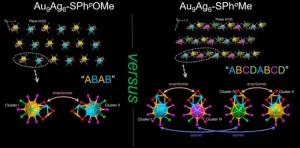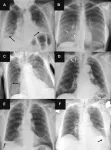(Press-News.org)
A new study finds that consanguinity – unions between close relatives - may increase the risk of common diseases such as type 2 diabetes and post-traumatic stress disorder (PTSD).
Researchers from the Wellcome Sanger Institute and their collaborators at Queen Mary University of London analysed the genomic data of diverse groups to investigate the relationship between autozygosity - a measure of genetic relatedness between an individual’s parents - and the prevalence of common diseases, with a novel method that reduces confounding due to sociocultural factors. They focused their analysis on the Genes & Health cohort, which consists of British individuals of Pakistani and Bangladeshi descent, as well as individuals of both European and South Asian descent from the UK Biobank.
The Genes & Health Community Advisory Board worked with the researchers to produce a publicly accessible document aimed at the lay public, explaining the study's motivations, methodology, and findings1.
The findings, published today (26 September) in Cell, help shed light on the complex interplay between genetics and health outcomes, especially among populations with higher rates of consanguinity.
Consanguinity is the social and cultural practice of marriage between two blood-related individuals who share a recent common ancestor, for example a grandparent or great-grandparent. This practice is observed across the world with varying prevalence. Over 10 percent of the global population consists of individuals who are the offspring of second cousins or closer2. In the UK, consanguinity is more common among some British South Asian communities.
Consanguinity increases the fraction of an individual’s genome that is inherited identically from both parents, a phenomenon termed autozygosity. While it is well established that consanguinity increases the risk of rare single-gene disorders by increasing the chance that an individual will inherit the same rare DNA change in a disease-causing “recessive" gene, its impact on common diseases remains understudied.
British Pakistanis and Bangladeshis have higher rates of several diseases than the UK average - for example a four-to-six-fold increased risk of developing type 2 diabetes compared to individuals of European ancestry3,4. However, these diseases involve a complex interplay of genetic and environmental factors, and, prior to this study, it was unknown whether consanguinity plays a role.
In this new study, researchers from the Wellcome Sanger Institute and their collaborators set out to assess the impact of consanguinity on complex genetic diseases.
The teams analysed genomic data to describe different patterns of consanguinity in distinct populations, including 23,978 British individuals of Pakistani and Bangladeshi descent from the Genes & Health cohort, and 397,184 individuals of European or South Asian descent from the UK Biobank cohort. They found that ~33% of individuals in Genes & Health were offspring of second cousins or closer, versus 2% of individuals of European descent in UK Biobank.
They then investigated the relationship between autozygosity and the prevalence of common diseases. For this, they restricted their analysis to a set of ~5700 individuals in Genes & Health and UK Biobank with parents who were inferred to be first cousins based on the genetic data. Within this restricted ‘highly consanguineous’ group, the precise level of autozygosity is randomly determined, between 4 to 15 per cent, and the researchers showed that it is not correlated with sociocultural and environmental factors, such as religiosity, education or diet, which might themselves influence health traits. This novel method helped ensure any observed links between autozygosity and diseases were biological in cause, rather than due to confounding.
Among the 61 complex genetic diseases examined in the Genes & Health and UK Biobank cohorts, researchers identified 12 diseases and disorders associated with increased autozygosity resulting from consanguinity. These included type 2 diabetes, asthma, and PTSD. The associations with type 2 diabetes and PTSD were then validated in a separate dataset from the consumer genetic company 23andMe Inc., using a between-sibling analysis technique5.
Analysis suggested that consanguinity may account for approximately 10 percent of type 2 diabetes cases among British Pakistanis and around 3 percent of cases among British Bangladeshis6. However, any health risks of consanguinity should be balanced with the positive social benefits of the practice as well as considered alongside other, more substantial modifiable risk factors, such as exercise, smoking and body mass index7.
This research reveals important insights into the factors influencing health outcomes and the associations between autozygosity and complex diseases within British Pakistani and Bangladeshi communities. It suggests that genetic studies of complex diseases should be broadened to pinpoint specific variants and genes with recessive effects.
Daniel Malawsky, first author of the study and PhD student at the Wellcome Sanger Institute, said: “While consanguinity has a smaller role in common diseases compared to other factors, it is still essential to understand its specific influence on health in these communities. Our new method exploring the natural variation in expected autozygosity amongst offspring of first cousins was a key breakthrough in helping us to test its impact. Some of our results suggested that cultural and environmental factors associated with consanguinity can sometimes exaggerate associations between autozygosity and health-related traits, or even mask truly causal associations. Our results suggest that some findings from previous studies linking autozygosity to complex traits in humans may have been misleading.”
Cllr Ahsan Khan, chair of the Genes & Health community advisory board and councillor at Waltham Forest, said: “This work underscores the significance of culturally sensitive approaches in health research, acknowledging the delicate balance between social benefits and any potential risks. The research team actively engaged community members, taking into account our traditions, cultures, and religious practices. By empowering people with the knowledge to make informed health decisions, we can help tackle the health disparities in our communities, especially in diseases like type 2 diabetes.”
Prof Sarah Finer, author of the study, co-lead of the Genes & Health research programme from Queen Mary, University of London, said: “This research would not have been possible without the many thousands of volunteers who generously agreed to participate in the Genes & Health study and UK Biobank.”
Dr Hilary Martin, senior author of the paper and group leader at the Wellcome Sanger Institute, said: “The findings have the potential to inform disease risk prediction as well as future research efforts to identify specific genetic variants associated with these diseases, not only within these specific communities but also globally, particularly across populations where consanguinity rates are higher. This could be used to help stratify individuals for earlier screening and identify potential drug targets.”
ENDS
Contact details:
Jelena Pupavac
Press Office
Wellcome Sanger Institute
Cambridge, CB10 1SA
Email: press.office@sanger.ac.uk
Notes to Editors:
1. The authors, in collaboration with the Genes & Health Community Advisory Board, explain the context of the study, motivation and results in a lay “frequently asked questions” document. You can access the document here: https://docs.google.com/document/d/1jSzoI8-RMTFxnpio0rIkpQwvYSiGvWa2gYVJvSZmXBg/edit#heading=h.69uhzfo708hs
For further details on the study, please refer to the publication.
2. https://www.pnas.org/doi/full/10.1073/pnas.0906079106
3. If you would like to know more about your chances of developing type 2 diabetes, you can complete Diabetes UK’s free online Know Your Risk tool (Diabetes UK – Know Your Risk of Type 2 diabetes) or call their helpline on 0345 123 2399 and get expert advice.
4. https://link.springer.com/article/10.1007/s00125-006-0325-1
5. Researchers conducted a within-sibling analysis using the consumer genetics company 23andMe Inc. cohort. This involved 545,806 research-consented individuals with at least one genetically-inferred full sibling also in the cohort, using self-reported phenotypes. This between-sibling analysis technique is considered gold-standard in the field for inferring causality of genetic factors.
6. These estimates assume that the consanguinity rates observed in the Genes & Health cohort are representative of the broader British Pakistani and Bangladeshi communities.
7. https://diabetesjournals.org/care/article/30/10/2695/30219/Risk-of-Type-2-Diabetes-Attributable-to-C-Reactive
Publication:
D.S. Malawsky, H.C. Martin et al. (2023) ‘Influence of autozygosity on common disease risk across the phenotypic spectrum.' Cell. DOI: 10.1016/j.cell.2023.08.028.
Funding:
This research was supported by Wellcome. For full funding acknowledgements, please refer to the publication.
Selected websites:
Genes & Health
Queen Mary, University of London’s Genes & Health group is the largest community-based genetics study in the world and is core-funded by Wellcome, the Medical Research Council, Higher Education Funding Council for England Catalyst, Barts Charity, and Health Data Research UK. Genes & Health are trying to reduce health inequalities by analysing the genetic information of 100,000 Bangladeshi and Pakistani people to improve health outcomes locally and globally. www.genesandhealth.org
The Wellcome Sanger Institute
The Wellcome Sanger Institute is a world leader in genomics research. We apply and explore genomic technologies at scale to advance understanding of biology and improve health. Making discoveries not easily made elsewhere, our research delivers insights across health, disease, evolution and pathogen biology. We are open and collaborative; our data, results, tools, technologies and training are freely shared across the globe to advance science. Funded by Wellcome, we have the freedom to think long-term and push the boundaries of genomics. We take on the challenges of applying our research to the real world, where we aim to bring benefit to people and society.
Find out more at www.sanger.ac.uk or follow us on Twitter, Instagram, Facebook, LinkedIn and on our Blog.
About Wellcome
Wellcome supports science to solve the urgent health challenges facing everyone. We support discovery research into life, health and wellbeing, and we’re taking on three worldwide health challenges: mental health, infectious disease and climate and health. https://wellcome.org/
END
Impact of parental relatedness on type 2 diabetes and other common diseases uncovered
The risk of developing several complex genetic diseases may be increased by the level of consanguinity in individuals, scientists find using a new pioneering approach that removes confounding by sociocultural factors
2023-09-26
ELSE PRESS RELEASES FROM THIS DATE:
Redefining global health security: A novel framework sheds light on equity and decolonial approaches
2023-09-26
Redefining Global Health Security: A Novel Framework Sheds Light on Equity and Decolonial Approaches
Kuala Lumpur, Malaysia and London, UK – 25 September 2023
In the wake of the COVID-19 pandemic, a new policy paper titled "Global Health Security and the Health-Security Nexus: Principles, Politics and Praxis" in the journal BMJ Global Health, warns of dangers and potential pitfalls associated with the increased attention paid to ‘global health security’ and the growing interaction between public health and security actors.
According to the authors, the prevailing ...
Inbreeding can be beneficial in the long run
2023-09-26
"Of all the subspecies of reindeer found in the high north, the Svalbard reindeer has the most inbreeding and the lowest genetic diversity," says Nicolas Dussex, a postdoc at Norwegian University of Science and Technology´s (NTNU) Department of Natural History.
It was only 7000-8000 years ago that the first reindeer migrated to Svalbard, most likely from Russia via Novaya Zemlya and the islands of Franz Josef Land. Perhaps there were no more than a few animals that established themselves on the arctic ...
Feds fund research that could slash US cancer deaths by 50%
2023-09-26
HOUSTON – (Sept. 26, 2023) – The Advanced Research Projects Agency for Health (ARPA-H) has awarded $45 million to rapidly develop sense-and-respond implant technology that could slash U.S. cancer-related deaths by more than 50%.
The award to a Rice University-led team of researchers from seven states will fast-track development and testing of a new approach to cancer treatment that aims to dramatically improve immunotherapy outcomes for patients with ovarian, pancreatic and other difficult-to-treat cancers.
“Instead of tethering patients to hospital beds, IV bags and external monitors, ...
Thiol ligands modify metal nanocluster structures and optical properties
2023-09-26
Metal nanoclusters are tiny, crystalline structures up to two nanometers (2 x 10-9 meters) in diameter that contain a few to hundreds of metal atoms. Understanding the precise assembly of metal nanoclusters is paramount to determining how different structures affect the properties and molecular interactions of these materials. Researchers recently synthesized two similar gold-silver (Au9Ag6) nanoclusters in a highly controlled manner to determine the precise atomic structure of each nanocluster and the effects of specific thiol ligands, or sulfur-containing binding molecules, on material synthesis.
Given their extremely small size, metal nanoclusters have ...
Researchers build and test a framework for achieving climate resilience across diverse fisheries
2023-09-26
(Santa Barbara, Calif.) — What makes for a successful climate-resilient fishery, one that sustainably produces resources for human benefit despite increasing climate stressors and human impacts? It’s a question that faces present and future fisheries, their practitioners and fishing communities as the world turns to the ocean to feed its growing population.
“For a fishery to be resilient it needs to be able to prepare for, resist, cope with, recover from, or adapt to any given impact,” said Jacob Eurich, who is a research associate at UC Santa Barbara’s Marine Science Institute, and a fisheries scientist at the Environmental Defense Fund (EDF). “In ...
Radiologists outperformed AI in identifying lung diseases on chest X-ray
2023-09-26
OAK BROOK, Ill. – In a study of more than 2,000 chest X-rays, radiologists outperformed AI in accurately identifying the presence and absence of three common lung diseases, according to a study published in Radiology, a journal of the Radiological Society of North America (RSNA).
“Chest radiography is a common diagnostic tool, but significant training and experience is required to interpret exams correctly,” said lead researcher Louis L. Plesner, M.D., resident radiologist and Ph.D. fellow in the Department of Radiology at Herlev and Gentofte Hospital in Copenhagen, Denmark.
While commercially available ...
SwRI, UTSA collaborate to detect traumatic brain injury through breath analysis
2023-09-26
SAN ANTONIO — September 26, 2023—Researchers from Southwest Research Institute (SwRI) and The University of Texas at San Antonio (UTSA) are developing techniques to detect traumatic brain injury (TBI) by analyzing breath for specific biomarkers. The project, led by SwRI’s Dr. Mark Libardoni and UTSA’s Dr. Marzieh Memar and Dr. Morteza Seidi, is supported by a $125,000 grant from the Connecting through Research Partnerships (Connect) program.
Breath analysis is performed by analyzing exhaled breath for specific biomarkers, such as metabolites, proteins and ...
Projects launch to map brain connections in mouse and macaque
2023-09-26
A complete map of all the connections in an entire mammalian brain may be in sight. Allen Institute researchers have just launched three new projects to construct large, detailed maps of neuronal connections in sections of the mouse and macaque brains, with an eye toward creating full wiring diagrams of these animals’ brains in the future. These projects are funded by the National Institutes of Health’s Brain Research Through Advancing Innovative Neurotechnologies® (BRAIN) Initiative.
Allen Institute research teams ...
National Science Foundation research award will expand the shift+OPEN initiative from the MIT Press
2023-09-26
The MIT Press is delighted to announce that it has received a two-year, $275,000 Early-Concept Grant for Exploratory Research (EAGER) from the National Science Foundation to expand the shift+OPEN initiative and shift at least two more journals to diamond open access. The Press will also use the grant to assess and compare the viability of open access models for advancing and sustaining the outputs of scientific and scholarly STEM and HSS research.
“We’re grateful to the National Science Foundation for their support of our growing shift+OPEN program,” says Nick Lindsay, Director for Journals and Open Access for the MIT ...
New report shows Food is Medicine interventions would save U.S. lives and billions of dollars
2023-09-26
Incorporating targeted food and nutrition strategies into healthcare on a national level will improve health and quality of life, reduce work for hospitals, and cut healthcare costs, according to experts studying Food is Medicine (FIM) efforts. The health and economic benefits of this approach are detailed in a report out today from researchers at the Food is Medicine Institute at the Friedman School of Nutrition Science and Policy at Tufts University, through support from The Rockefeller Foundation.
The True Cost of Food: Food is Medicine Case Study quantifies the potential health and economic benefits of FIM efforts, which refer to food-based nutrition ...
LAST 30 PRESS RELEASES:
How periodontitis-linked bacteria accelerate osteoporosis-like bone loss through the gut
Understanding how cells take up and use isolated ‘powerhouses’ to restore energy function
Ten-point plan to deliver climate education unveiled by experts
Team led by UC San Diego researchers selected for prestigious global cancer prize
Study: Reported crop yield gains from breeding may be overstated
Stem cells from human baby teeth show promise for treating cerebral palsy
Chimps’ love for crystals could help us understand our own ancestors’ fascination with these stones
Vaginal estrogen therapy not linked to cancer recurrence in survivors of endometrial cancer
How estrogen helps protect women from high blood pressure
Breaking the efficiency barrier: Researchers propose multi-stage solar system to harness the full spectrum
A new name, a new beginning: Building a green energy future together
From algorithms to atoms: How artificial intelligence is accelerating the discovery of next-generation energy materials
Loneliness linked to fear of embarrassment: teen research
New MOH–NUS Fellowship launched to strengthen everyday ethics in Singapore’s healthcare sector
Sungkyunkwan University researchers develop next-generation transparent electrode without rare metal indium
What's going on inside quantum computers?: New method simplifies process tomography
This ancient plant-eater had a twisted jaw and sideways-facing teeth
Jackdaw chicks listen to adults to learn about predators
Toxic algal bloom has taken a heavy toll on mental health
Beyond silicon: SKKU team presents Indium Selenide roadmap for ultra-low-power AI and quantum computing
Sugar comforts newborn babies during painful procedures
Pollen exposure linked to poorer exam results taken at the end of secondary school
7 hours 18 mins may be optimal sleep length for avoiding type 2 diabetes precursor
Around 6 deaths a year linked to clubbing in the UK
Children’s development set back years by Covid lockdowns, study reveals
Four decades of data give unique insight into the Sun’s inner life
Urban trees can absorb more CO₂ than cars emit during summer
Fund for Science and Technology awards $15 million to Scripps Oceanography
New NIH grant advances Lupus protein research
New farm-scale biochar system could cut agricultural emissions by 75 percent while removing carbon from the atmosphere
[Press-News.org] Impact of parental relatedness on type 2 diabetes and other common diseases uncoveredThe risk of developing several complex genetic diseases may be increased by the level of consanguinity in individuals, scientists find using a new pioneering approach that removes confounding by sociocultural factors







